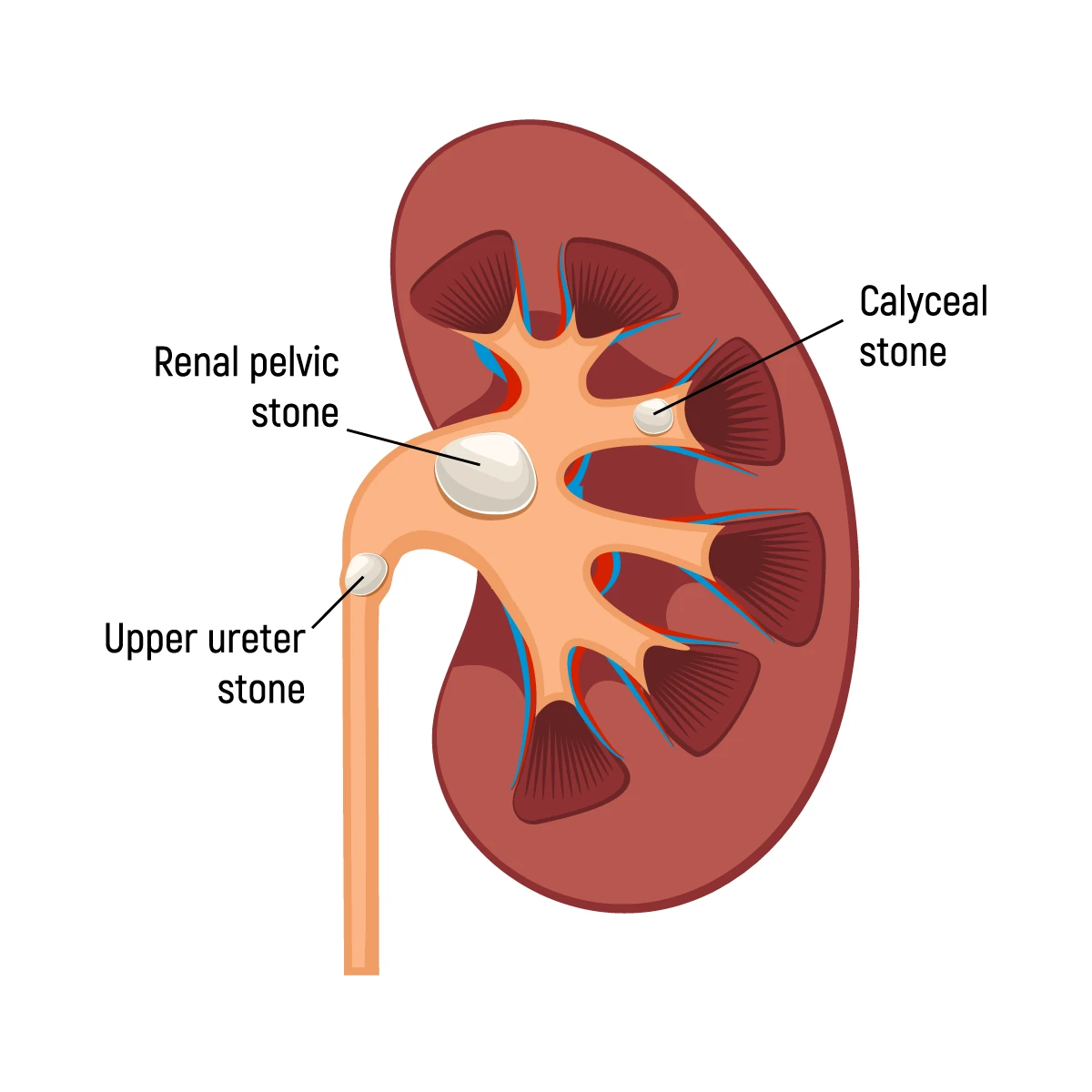Ureteral stones
A kidney stone that moves into the ureter is a painful condition known as a ureteral stone. These crystal-like hard stones get lodged into ureter (the tube that connects your kidneys to your bladder) and sometimes need surgery to remove them. However, most of them resolve on their own with changes to your diet and medication.
At Advocate Health Care, our team of urological specialists use the latest treatment and testing options to get you the care you need for ureteral stone management.

What are ureteral stones?
A ureteral stone is a hard mineral deposit that forms in the kidneys and passes through the ureter (the tube that connects the kidney to the bladder). You have two ureters, one connected to each kidney. Ureteral stones can enter either the right or left ureter.
Ureteral stones may be categorized based on their location in the ureter. If your ureteral stones are located near the renal pelvis (near the center of your kidney), they are sometimes called proximal stones. If the stones are at the end of your ureter, they are known as distal ureteral stones.
These stones are formed in the kidney from waste products normally found in urine, such as calcium, oxalate and uric acid. Ureteral stones can vary in size. Most of the time they are small enough to pass through the urinary tract unnoticed, while larger ones can cause significant pain and blockages.
Types of ureteral stones
There are four types of ureteral stones:
- Calcium stones: Stones that form due to elevated levels of calcium, uric acid or oxalate (a chemical found in plants and animals). These are the most common.
- Uric acid stones: Stones that form from a high-protein diet or not drinking enough water.
- Struvite stones: Stones that form from frequent urinary tract infections (UTIs).
- Cystine stones: Stones that form from elevated levels of the amino acid cystine.
Kidney stones vs. ureteral stones: What’s the difference?
Ureteral stones are kidney stones. The only difference is the location. A kidney stone is a stone that is in the kidneys, while a ureteral stone has moved from the kidney and into one of the ureters.
Ureteral stone risk factors
Ureteral stones can form in anyone, yet they are more common in white men or people assigned male at birth between the ages of 40 and 60. Dehydration or not drinking enough water are the most common causes of ureteral stones.
Other factors that increase the risk of developing ureteral stones include:
- Eating a diet high in spinach, nuts, chocolate, tea, salt and animal proteins.
- Having a family or personal history of kidney stones.
- Being diagnosed with conditions such as gout, UTIs, kidney disease, diabetes or hypothyroidism.
- Having a high body mass index (BMI) or obesity.
- Taking medications such as diuretics, antacids with calcium and antibiotics.
- Living in a hot climate where dehydration is more likely due to increased sweating.
Drinking enough water and making changes to your diet can decrease your risk and help with preventing ureteral stones.
Ureteral stone symptoms
Ureteral stone symptoms are very similar to those experienced with kidney stones. In most cases, ureteral stones will pass through the urinary system on their own and not cause any symptoms.
However, sometimes these stones can get stuck in the ureters and block them, causing symptoms such as:
- Pain that travels to the lower abdomen
- Intermittent pain in your back below the rib cage
- Nausea and vomiting
- Blood in your urine
- Pain or burning when you pee
- Frequent and sudden urge to go to the bathroom
- Not being able to fully empty your bladder
- Cloudy urine
In most cases, smaller stones will pass within one to two weeks. Once it reaches the bladder, it typically passes in a few days. However, if you are experiencing severe pain or any of the above symptoms, schedule an appointment with your provider.
Diagnosis of ureteral stones
Your provider will perform a physical examination, ask about your symptoms and perform a urinalysis. Your provider may also order blood tests to check kidney function and levels of electrolytes, uric acid and calcium.
Other tests your provider may perform include:
Digital imaging tests may help your urologist see the shape, size and location of your ureteral stones to provide the proper treatment.
Ureteral stone treatment
Treatment is aimed at ureteral stone removal. Non-surgical ureteral stone treatment options your provider may recommended could be simple such as taking prescription diuretics and making lifestyle changes.
Your Advocate urologist may recommend minimally invasive surgical procedures such as:
- Shockwave lithotripsy: High energy shockwaves are used to break the ureteral stones, making them easier to move through the ureter.
- Ureteroscopy: A small tube is inserted into your urethra and moved through the bladder and into the ureter. The tube includes a laser that breaks up your ureteral stones so they can move through the ureter and into the bladder.
- Percutaneous nephrolithotomy: If your ureteral stones are too large or there are too many of them, your doctor may consider percutaneous nephrolithotomy. This is when a small tube is inserted into the ureter through a small incision and removes the stones through suction.
Learn more about our treatment options.
Living with ureteral stones
Managing your symptoms and taking prevention measures are keys to living with ureteral stones.
Some steps you can take to manage your symptoms include drinking plenty of water and taking over-the-counter nonsteroidal anti-inflammatory drugs (NSAIDs) to get relief from pain. Common NSAIDs include ibuprofen and naproxen. Talk with your doctor before using NSAIDs.
Some ways to prevent ureteral stones include:
- Limiting animal protein in your diet
- Limiting salt intake
- Limiting the amount of spinach, almonds, potatoes and cashews in your diet
Get care
We help you live well. And we’re here for you in person and online.
